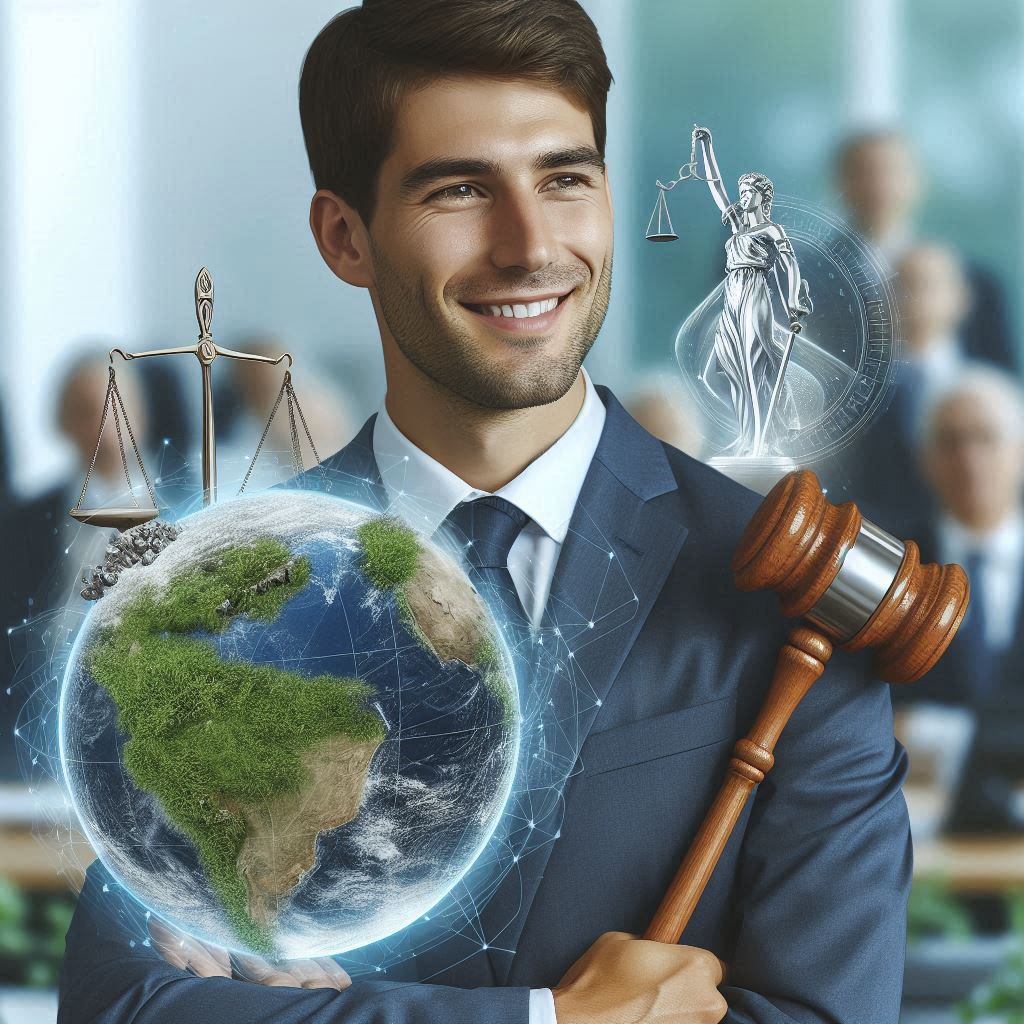Introduction
An environmental lawyer specializes in legal matters related to environmental protection and conservation.
Their role is crucial in safeguarding the environment from harmful activities and ensuring compliance with environmental laws.
Environmental lawyers have a wide range of daily responsibilities that contribute to their mission of protecting the environment. These responsibilities include:
- Legal Research and Analysis: Environmental lawyers conduct research on environmental laws and regulations to provide legal advice to clients.
They analyze complex legal issues to develop strategies for compliance and enforcement. - Drafting Legal Documents: They draft legal documents such as contracts, permits, and briefs related to environmental issues.
These documents are essential for providing legal guidance and representing clients in legal proceedings. - Client Representation: Environmental lawyers represent clients in court hearings, negotiations, and other legal proceedings.
They advocate on behalf of their clients to ensure that their interests are protected and defended. - Environmental Impact Assessment: They assess the environmental impact of proposed projects and developments to determine compliance with environmental regulations.
This helps in identifying potential risks and mitigating adverse effects on the environment. - Compliance Monitoring: Environmental lawyers monitor compliance with environmental laws by conducting audits and inspections.
They ensure that businesses and individuals adhere to regulations to prevent harm to the environment. - Advocacy and Policy Development: They engage in advocacy efforts to promote environmental protection and conservation.
Environmental lawyers also participate in the development of environmental policies to address current and emerging environmental issues.
Research and Analysis
Conducting research on environmental laws and regulations
Environmental lawyers must dive deep into legal texts to understand environmental laws and regulations. They review statutes, case law, and administrative codes.
This research involves examining federal, state, and local laws. Lawyers use legal databases and libraries to find relevant information.
They need to understand complex regulations like the Clean Air Act and the Endangered Species Act.
This research forms the foundation for advising clients and preparing legal strategies.
A thorough grasp of existing laws ensures that legal arguments are based on accurate information.
How laws apply to specific cases
Once lawyers have gathered the necessary information, they analyze how laws apply to their specific cases.
They assess the facts of each case against relevant laws and regulations.
This analysis involves identifying legal precedents and interpreting how they influence current cases.
Lawyers must evaluate how various laws interact and impact their client’s situation.
They need to develop arguments that align with legal standards and support their client’s objectives.
Accurate application of the law is critical for crafting effective legal strategies and representing clients effectively.
Staying updated on changes in environmental policies
Environmental lawyers must stay current with changes in environmental policies and regulations.
They follow updates from government agencies and industry groups.
Continuous learning is necessary to keep pace with evolving laws and new legal precedents.
Lawyers subscribe to legal journals, attend professional conferences, and participate in continuing education.
Staying informed allows them to provide the most relevant advice and advocacy.
This vigilance ensures they can effectively address new legal challenges and advocate for clients in a dynamic legal environment.
Transform Your Career Today
Unlock a personalized career strategy that drives real results. Get tailored advice and a roadmap designed just for you.
Start NowEffective research and analysis are crucial in environmental law.
By staying informed and applying laws accurately, lawyers ensure they provide valuable, up-to-date legal support for their clients.
Read: Financial Aid for Environmental Law Students
Client Consultation
Meeting with clients to understand their environmental concerns
As an environmental lawyer, one of the key daily responsibilities is client consultation.
This involves meeting with clients to gain a thorough understanding of their environmental concerns.
It is crucial to listen attentively to the clients’ issues and ask relevant questions to gather all necessary information.
Providing legal advice on how to comply with regulations
During these consultations, the environmental lawyer provides legal advice on how clients can effectively comply with environmental regulations.
This may include explaining the laws and regulations that apply to their specific situation, outlining the potential consequences of non-compliance, and recommending strategic courses of action to ensure compliance.
Drafting legal documents based on client needs
Additionally, part of the client consultation process involves drafting legal documents tailored to the clients’ needs.
This could range from creating contracts, agreements, or compliance plans to representing clients in administrative proceedings or litigation.
The lawyer must ensure that all legal documents are accurate, comprehensive, and in line with current environmental laws and regulations.
Overall, client consultation is a crucial aspect of an environmental lawyer’s daily responsibilities, as it allows them to provide personalized legal guidance and support to clients facing environmental challenges.
By effectively communicating with clients, offering sound legal advice, and drafting necessary legal documents, environmental lawyers can help their clients navigate complex environmental issues with confidence.
Read: Steps to Becoming an Environmental Lawyer in the USA
Litigation and Advocacy
Environmental lawyers play a crucial role in litigation and advocacy to protect the environment and ensure that laws are upheld.
They represent clients in court cases related to environmental issues, such as pollution, land use disputes, or endangered species protection.
Representing clients in court cases related to environmental issues
In these cases, environmental lawyers use their legal expertise to argue on behalf of their clients and strive to achieve a favorable outcome that promotes environmental conservation and sustainability.
They work diligently to gather evidence, prepare legal briefs, and present arguments in court to defend their clients’ rights and advocate for environmental protection.
Advocating for environmental protection in legal settings
Furthermore, environmental lawyers advocate for environmental protection in various legal settings, including legislative hearings, administrative proceedings, and public policy debates.
They utilize their knowledge of environmental laws and regulations to shape policies and advocate for stronger protections for the environment.
Transform Your Career Today
Unlock a personalized career strategy that drives real results. Get tailored advice and a roadmap designed just for you.
Start NowWorking with other lawyers and agencies to achieve environmental goals
Collaboration is a key aspect of the work of environmental lawyers, as they often work closely with other lawyers, environmental advocacy groups, government agencies, and community organizations to achieve common environmental goals.
By collaborating with various stakeholders, environmental lawyers can leverage their expertise and resources to address pressing environmental issues and advocate for meaningful change.
Overall, the daily responsibilities of an environmental lawyer in litigation and advocacy involve representing clients in court, advocating for environmental protection in legal settings, and working collaboratively with others to achieve environmental goals.
Through their dedicated efforts, environmental lawyers play a vital role in upholding environmental laws, protecting natural resources, and fighting for a sustainable future.
Read: How Environmental Lawyers Influence Urban Planning

Negotiation and Settlement
Negotiating settlements between parties in environmental disputes
As an environmental lawyer, one of the key daily responsibilities is negotiation and settlement.
This involves working with various parties involved in environmental disputes to reach a mutually beneficial agreement.
Negotiating settlements is a delicate process that requires a deep understanding of environmental laws and regulations.
It involves finding common ground among all parties and ensuring that the agreed-upon terms are fair and reasonable.
Drafting agreements to resolve conflicts outside of court
Environmental lawyers also play a crucial role in drafting agreements to resolve conflicts outside of court.
These agreements outline the terms of the settlement and specify the obligations of each party involved.
Ensuring agreements are legally sound and protect environmental interests
One of the primary goals in this process is to ensure that the agreements are legally sound and protect the interests of the environment.
Environmental lawyers must carefully review and analyze all aspects of the agreement to ensure that they comply with relevant laws and regulations.
Moreover, environmental lawyers must also consider the long-term implications of the agreements they draft.
They must anticipate any potential future disputes or challenges that may arise and include provisions that address these issues.
Overall, negotiation and settlement are essential components of an environmental lawyer’s daily responsibilities.
By effectively managing these processes, environmental lawyers can help resolve disputes and protect the environment for future generations.
Read: Environmental Law: What Does an Environmental Lawyer Do?
Compliance Monitoring
As an environmental lawyer, one of the core responsibilities is compliance monitoring.
This involves closely monitoring clients’ activities to ensure they are in line with environmental laws and regulations.
Transform Your Career Today
Unlock a personalized career strategy that drives real results. Get tailored advice and a roadmap designed just for you.
Start NowThis can be a challenging task as the laws in this field are extensive and constantly evolving.
Monitoring clients’ compliance with environmental laws
This is an essential part of the job.
Environmental lawyers must regularly review clients’ operations and practices to identify any potential violations of environmental laws.
This may involve conducting on-site visits, reviewing documentation, and analyzing data to ensure compliance.
Advising on corrective actions when violations occur
In case of any violations, environmental lawyers must work closely with clients to develop and implement corrective actions.
This may involve drafting compliance plans, negotiating with regulatory agencies, or representing clients in enforcement actions.
It is crucial to address violations promptly and effectively to minimize legal liabilities and environmental harm.
Helping clients navigate complex regulatory requirements
Environmental laws and regulations are intricate and can be difficult to understand.
Environmental lawyers play a vital role in assisting clients in interpreting and complying with these laws.
They provide guidance on permit applications, regulatory approvals, and other compliance-related matters.
By staying up-to-date on the latest regulations, lawyers can help clients avoid costly mistakes and legal issues.
In general, compliance monitoring is a fundamental aspect of an environmental lawyer’s daily responsibilities.
By diligently monitoring clients’ compliance, advising on corrective actions, and guiding them through complex regulatory requirements, environmental lawyers play a crucial role in protecting the environment and ensuring sustainable business practices.
Education and Outreach
Educating clients and the public on environmental laws
Environmental lawyers play a crucial role in educating their clients and the public about environmental laws.
They must stay updated with the most current regulations and guidelines to effectively communicate these laws to their clients.
In addition to educating clients, environmental lawyers also participate in outreach activities to inform the public about environmental issues and legal requirements.
Participating in environmental advocacy campaigns
Participating in environmental advocacy campaigns is another essential responsibility of environmental lawyers.
They use their legal expertise to support and advance environmental causes through lobbying, public speaking, and grassroots organizing.
By actively engaging in advocacy campaigns, environmental lawyers help raise awareness about environmental issues and promote legislative changes that benefit the environment.
Promoting sustainability and conservation efforts
Another key aspect of an environmental lawyer’s daily responsibilities is promoting sustainability and conservation efforts.
Transform Your Career Today
Unlock a personalized career strategy that drives real results. Get tailored advice and a roadmap designed just for you.
Start NowThey work with organizations, businesses, and government agencies to develop and implement strategies that reduce environmental impacts, protect natural resources, and promote sustainable practices.
Environmental lawyers advocate for policies that support conservation efforts and work to ensure compliance with environmental regulations.
In a nutshell, education and outreach are integral components of an environmental lawyer’s daily responsibilities.
By educating clients and the public, participating in advocacy campaigns, and promoting sustainability efforts, environmental lawyers play a critical role in protecting the environment and advancing environmental conservation initiatives.
Conclusion
Being an environmental lawyer involves a dynamic range of responsibilities that are both diverse and challenging.
From conducting research and drafting legal documents to representing clients in court, environmental lawyers play a crucial role in upholding environmental laws and regulations.
The importance of their work cannot be understated, as they work tirelessly to protect our planet and ensure sustainable practices are in place.
Their dedication to the environment is commendable, and their efforts have a significant impact on the preservation of our natural resources.
If you are passionate about environmental issues and interested in making a positive impact on the world, pursuing a career in environmental law could be the perfect path for you.
By becoming an environmental lawyer, you can contribute to the protection of our planet and help create a more sustainable future for generations to come.




